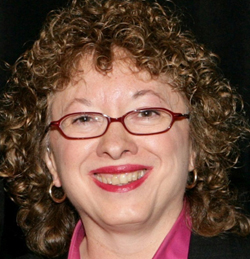Living with a family in Port au Prince – while photographing the wreckage and the people to help raise money for disaster relief — he fell in love with the country and vowed to return and help.
During his stay, he met a 17-year-old boy named Tassy Fils-aime, who had a life-threatening cancerous tumor on his face. Rosenberger, with the help of some friends, raised enough money to bring Fils-aime to Pittsburgh for life-saving surgery.
Rosenberger became more involved with Haitians living in poverty, learning Creole and returning once or twice a month. He came to understand more about poor neighborhoods there and throughout the developing world, eventually having what could only be called an epiphany.
He looked at the piles of plastic waste that were considered eyesores throughout the country and saw potential. He realized that all those bottles could be turned into fabric and made into clothing, creating the jobs necessary to lift people out of poverty.
After being told numerous times his idea would never work, his company, Thread International, was given a boost by Pittsburgh’s Idea Foundry. Three years later, it is bringing in revenue and negotiating with major clothing brands. And, best of all, Thread International is creating jobs in Haiti, Honduras and the United States.
What inspired you to found Thread International?
In my trips to Haiti, I developed the philosophy that poverty is a disease, just like malaria and tuberculosis, and it’s the largest epidemic on the planet. We talk about Ebola killing thousands of people, but poverty is in the process of killing three billion people. Curing this epidemic by the time I have grandchildren is possible through dignified employment.
While charity can do good, it can also have a negative effect if people aren’t careful. It has its place in the developing world, but we’ve really come to the conclusion that the solution will come through jobs.
When my friends and I took Tassy back to Haiti after his surgery, we realized that he was going to have the same future as other young men in Port au Prince: a short life and a violent death. We decided to stick with Tassy until he didn’t need us anymore. We developed the idea that when a person has a job and can pay for their own goods and services, they don’t need us.
In Haiti, there aren’t a lot of jobs to be had. Most aid efforts focus on job preparedness, but what they need is job creation. So about 18 months after I first went to Haiti, Thread was born.
How did you get started?
When I realized I was going to create a business, I immediately knew that I was going to need to get folks who were smarter than me around me. I went to a buddy of mine from school, Lee Kimball, who is now Thread’s COO. I had been working on the Tassy project with Frank Macinsky, who I had hired to work with me at the ad agency; he’s now our director of marketing.
His friend from high school, Kelsey Halling, joined us as our director of community development, and we were lucky enough to get our director of production, Jenna Knapp, from the Idea Foundry. That’s our team, along with a string of interns.
Did you take advantage of any local resources to get off the ground?
Every time we explained our idea, people would tell us it was a great idea, but it was pie in the sky. They said we were thinking too big. We got used to being told we were crazy. As a team, we’re comfortable with disarray and entropy. We have the same underdog spirit as Pittsburgh, which knows about falling down and getting back up again. It’s the same thing we’re seeing in Haiti.
We took our idea to the Idea Foundry, thinking there was no way they’d fund us. Thank God there are organizations that fund concepts and vision. The Idea Foundry said it would give us funding to explore this idea. Just getting that first organization to believe in you means everything!
Beyond seed funding, they helped us write a business plan and got us an employee [Knapp].
We later got $700,000 from friends, family and angel investors, from Innovation Works (Ben Franklin Technology Partners of Southwest PA) and from the Urban Redevelopment Authority of Pittsburgh. All this was an important reason why we stayed in Pittsburgh.
We also applied for a mentorship program called GoodCompany Ventures in Philadelphia, in which we got feedback from actual investors, moving us ahead with our business plan and our pitches. They also introduced us to investors.
We moved into The Beauty Shoppe, a Pittsburgh co-working space, where we stayed our first two years. Recently we took up residence in an office in East Liberty in Pittsburgh.
I don’t think there’s a better place to start a business than in Pennsylvania.
How has the company grown?
We have been bringing in revenue for about 18 months. We developed our first five fabrics this year, and we’re in contract negotiations with some major brands whose names you would recognize.
So far, the network we have created is supporting 2,700 jobs in Haiti and Honduras. (We started there in December 2013.) Each month that network is picking up and moving about 300,000 pounds of waste from some of the poorest neighborhoods in the Western Hemisphere.
How does the process work?
Only about 25 percent of waste gets picked up in these areas; waste removal favors the rich, who can pay to have it done. In Haiti, 100 pounds of recycled plastic equals more than a day’s wage, so they can achieve a sustainable recycling culture faster than in high-income countries. It’s possible to recycle 90 percent of the waste in Haiti into useful products, and all of that equals jobs.
The Haitians and Hondurans collect it and turn it into clean plastic flake. We used to send it to China, but now we take it to the United States to process the flake into fabric.
We realized that the fabric industry in the United States has dwindled in the past decade, with the work going overseas. We learned about polyester fabric from people who worked in the mills in the South. Virgin polyester comes from oil; by recycling bottles into finished fabric, we use 80 percent less energy than in making virgin polyester.
The vast majority of the factories we contract with are in the Southeast and Northeast (Massachusetts and New Hampshire), the traditional homes of the fabric industry.
The fabric is then cut, sewn and finished in Haiti and Honduras, where it is made into clothing, bags and other products.
We’re a business-to-business company. We realized that the apparel industry is in a lot of trouble, because it’s still one of the most opaque and dangerous industries. Clothing companies are losing customers because they’re not responsible enough.
We figured if we could create a 100-percent transparent supply chain — where people could see where this product comes from, and document that and share the numbers and stories with our customers and, in turn, the apparel companies’ customers — people would buy it.
We’re doing for clothing what Whole Foods did for groceries.
What’s next for Thread?
We don’t see any reason why any company that uses fabric couldn’t use Thread in the next five years. We see growth. Now we’re looking for venture capital in order to grow, and in the next four to six months we plan on closing with some multinational clothing brands. We will expand to more countries. Right now we’re looking at Southeast Asia and trying to figure out how to get into Africa.
The reason that we’re called Thread is that we believe everyone is connected — there’s a thread that runs through all of us. The better we’re able to tell the story of the poor, the more likely we are to end poverty forever.
Rosenberger has also founded a nonprofit called Team Tassy, which helps with health, education and preparing families for work in poor neighborhoods in Haiti. Tassy himself is working on his education and giving back to his community through Team Tassy.
Writer: Susan L. Pena



